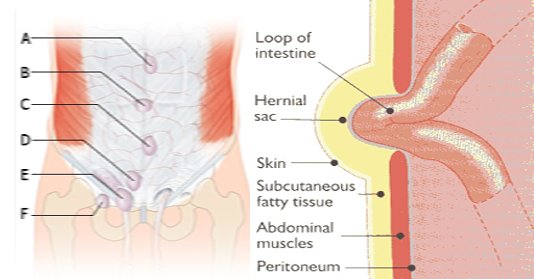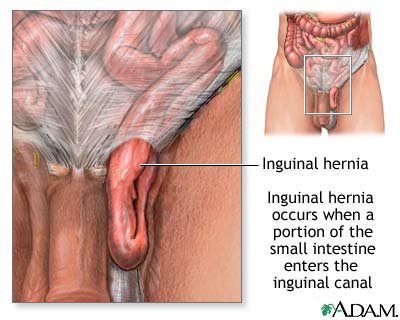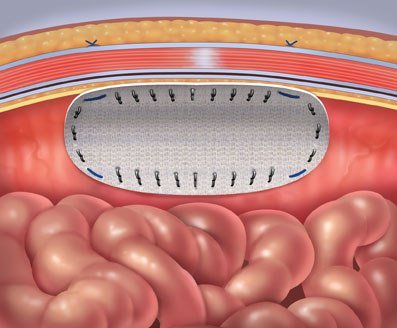Complex Abdominal Wall Hernias
Anatomy and hernia surgery
(A) Epigastric Hernia
(B) Umbilical Hernia
(C) Ventral/Incisional Hernia
(D) Direct Inguinal Hernia
(E) Indirect Inguinal Hernia
(F) Femoral Hernia
A hernia occurs any time that an internal body part pushes into an area outside of its own cavity into another cavity. Although hernias can technically develop anywhere, they most often occur in the abdomen. In this case, the abdominal lining ruptures, and a portion of the internal abdominal contents, usually the intestines, protrude through the ruptured site.
The rupture can be caused by the normal aging, by physical stress (acquired hernia) or by a weakness present at birth (congenital hernia). The hernia can grow larger and more painful over time and become more symptomatic during activity.
Hernia Symptoms
You may notice a bulge, pain, or swelling in the location of a hernia. Sometimes you may experience pain or a heavy sensation while lifting, coughing or bending over. Pain can range from sharp and sudden to a dull ache and will usually increase at the end of the day or after periods of extended standing. There are many hernias that are asymptomatic or in other words do not cause symptoms.
The first stage of a hernia is a weakened or torn abdominal wall. The weakened area then begins to form a hernia sac, which may contain fat, a portion of intestine or other organs. Soon the abdominal contents start to push further and further into the sac forming a noticeable bulge.
Usually the bulge will flatten out or reduce when you lie down or can be pushed back into the abdomen. If the intestine becomes trapped inside the sac, this is called incarcerated and the hernia will not be able to be pushed back in. The intestines can become trapped so tightly that they become strangulated. If this condition is left untreated, that portion of intestine may die, casing intense pain and a blocked intestine. This requires emergency attention and surgery.
Treatment and Hernia Surgery
If your hernia is small and not causing any pain, your doctor may recommend waiting and monitoring it closely before recommending surgery. If your hernia is growing or causing you pain, it should be treated promptly to avoid any serious complications.
Hernia surgery can be performed in many ways depending on the location, the size and history of previous surgeries. It may be repaired using a mesh patch that is surgically placed over or under the tear, and additionally, a mesh plug can be used to fill in the hole that has formed in the abdominal wall. There are a multitude of mesh materials; each type of mesh is specifically chosen each specific case.
Here at Suncoast Surgical Associates, we perform the majority of our hernia repairs laparoscopically. By doing this our patient have less pain, decreased recovery time, minimal scarring and decreased risk of recurrence. After discussion with you, we can make a decision depending on your specific case.
Preparing for Hernia Surgery
You will either have a phone or in-person interview with the hospital anesthesia team to discuss your procedure, notify you of medications you should stop or take the day of surgery and let you know what time you should come in for your surgery. You will be asked to come in a couple hours earlier than your schedule surgery time. On the day of your surgery :
No eating or drinking after midnight the night before surgery
Take any drugs your doctor said you may take with a sip of water
Shower the night before or morning of your surgery
After Hernia Surgery
Most hernia operations are performed as outpatient procedures, where you will be able to go home the same day as surgery. We will monitor you in the hospital until your pain is controlled, you are eating and drinking and you are able to walk and urinate.
Once you return home, we recommend icing the area of the surgery for the first 12 hours as needed to decrease any swelling. You may also have a pressure dressing or an abdominal binder which is to be worn as much as possible. You will need to limit any heavy lifting. You will be able to walk, climb stairs and bend although there will be some discomfort.
For men after inguinal hernia surgery, it is normal to have scrotal swelling and bruising around the penis and in the scrotum. This usually presents a few days after surgery, but will slowly improve over the next coupe weeks. Wearing briefs to keep your scrotum elevated will decrease the amount of swelling and discomfort. Be sure to start eating a diet that is high in fiber and liquids.
You may want to take stool softeners if you experience constipation which is commonly due to use of pain medications. You should be able to return to work within a few days for desk jobs and after a couple weeks for more physically demanding jobs. We usually recommend no heavy lifting greater than 10 pounds for 6 weeks after hernia surgery. Ask you doctor for your specific restrictions.




